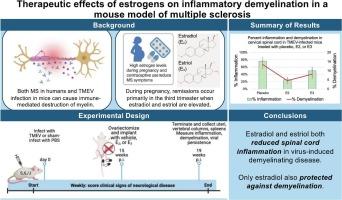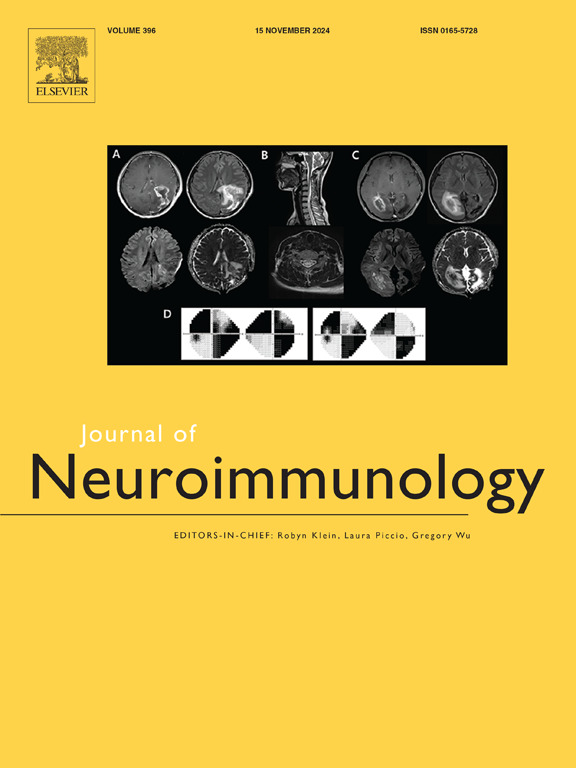雌激素对多发性硬化症小鼠模型炎性脱髓鞘的治疗作用
IF 2.5
4区 医学
Q3 IMMUNOLOGY
引用次数: 0
摘要
多发性硬化症(MS)是一种神经退行性自身免疫性疾病,免疫系统以神经轴突髓鞘为靶点,导致多种神经症状。性激素被认为是MS的重要因素,因为怀孕和口服避孕药可以减少症状和复发。在怀孕期间,缓解主要发生在妊娠晚期,此时雌二醇和雌三醇升高。我们研究了这两种激素在病毒诱导的MS. theiler 's小鼠脑脊髓炎病毒(TMEV)引起类似慢性进行性ms的小鼠炎症性脱髓鞘疾病的实验模型中的作用。为了研究雌激素治疗在TMEV模型中的效果,我们使用了6组5周龄雌性SJL/J小鼠。小鼠分别感染TMEV或假感染PBS。在慢性炎症疾病期间,每15周切除所有小鼠的卵巢,并植入1)载体2)雌二醇或3)雌三醇的缓释颗粒。每周对疾病临床体征的评估显示,雌二醇治疗与整个疾病过程中更好的临床评分相关,两个治疗组的评分都明显高于安慰剂(载体)。在终止(24周)时,我们检查了所有小鼠脊髓脱髓鞘和炎症的百分比,并测量了TMEV抗体的血清水平。雌二醇和雌三醇显著降低脊髓炎症,但只有雌二醇显著降低脱髓鞘。病毒感染和激素治疗均显著影响TMEV抗体水平。无论感染状况如何,所有小鼠的抗体水平在雌二醇组和安慰剂组、雌二醇组和安慰剂组之间也存在显著差异。这些结果提示雌激素可能是治疗由病毒感染引起的进行性多发性硬化症的有效方法。本文章由计算机程序翻译,如有差异,请以英文原文为准。

Therapeutic effects of estrogens on inflammatory demyelination in a mouse model of multiple sclerosis
Multiple Sclerosis (MS) is a neurodegenerative autoimmune disease in which the immune system targets the myelin sheath of nerve axons, leading to a variety of neurological signs. Sex hormones are thought to be important factors in MS since pregnancy and oral contraceptives reduce both symptoms and relapses. During pregnancy, remissions occur primarily in the third trimester when estradiol and estriol are elevated. We have investigated the role of these two hormones in an experimental model of virus-induced MS.
Theiler's murine encephalomyelitis virus (TMEV) causes an inflammatory demyelinating disease in mice that resembles chronic progressive MS. To investigate the efficacy of estrogen therapy in the TMEV model, we used 6 experimental groups of 5-week-old female SJL/J mice. Mice were either infected with TMEV or were sham infected with PBS. At 15 weeks pi, during the chronic inflammatory disease, all mice were ovariectomized and implanted with slow-release pellets of either 1) vehicle 2) estradiol or 3) estriol. Weekly evaluation of clinical signs of disease revealed that estradiol treatment was associated with better clinical scores throughout the disease, and both treatment groups had significantly better scores than placebo (vehicle). At termination (24 weeks) we examined the percent demyelination and inflammation in spinal cords, and measured serum levels of TMEV antibodies, for all mice. Estradiol and estriol significantly decreased inflammation in the spinal cord, but only estradiol significantly decreased demyelination. Virus infection and hormone treatment each significantly affected levels of TMEV antibodies. Antibody levels also differed significantly between estradiol and placebo groups, and between estriol and placebo groups, for all mice regardless of infection status. These results suggest that estrogens may be effective therapies for progressive multiple sclerosis induced by viral infections.
求助全文
通过发布文献求助,成功后即可免费获取论文全文。
去求助
来源期刊

Journal of neuroimmunology
医学-免疫学
CiteScore
6.10
自引率
3.00%
发文量
154
审稿时长
37 days
期刊介绍:
The Journal of Neuroimmunology affords a forum for the publication of works applying immunologic methodology to the furtherance of the neurological sciences. Studies on all branches of the neurosciences, particularly fundamental and applied neurobiology, neurology, neuropathology, neurochemistry, neurovirology, neuroendocrinology, neuromuscular research, neuropharmacology and psychology, which involve either immunologic methodology (e.g. immunocytochemistry) or fundamental immunology (e.g. antibody and lymphocyte assays), are considered for publication.
 求助内容:
求助内容: 应助结果提醒方式:
应助结果提醒方式:


